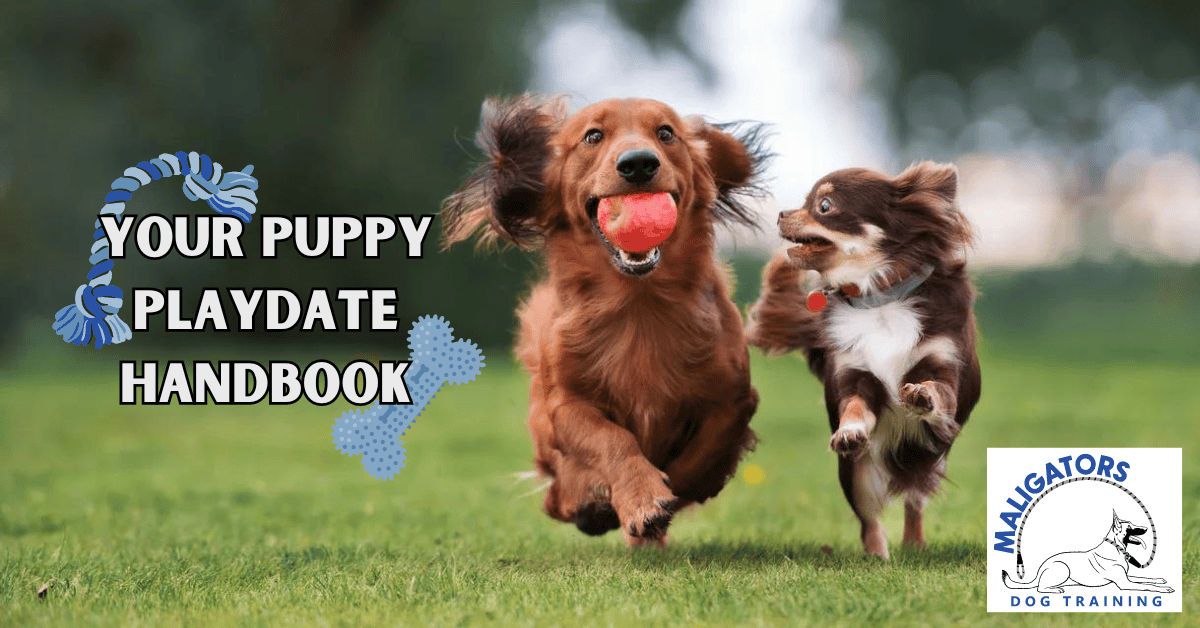Whether your furry friend is still a puppy or just a puppy at heart, setting up a playdate for them will help them get some much-needed playtime. As much as your pup enjoys spending time with you, being around other dogs provides them with additional enrichment. Not only is a puppy playdate enjoyable for most pups, but it can also help them learn important social skills. If you’re considering arranging a playdate for your furry friend, read the tips below to understand the benefits and how to do one successfully.

Reasons to have a puppy playdate
Puppy playdates benefit the development and upkeep of your dog’s socialization. Similarly to humans, dogs must develop good social habits, which they learn through interaction with other dogs. It’s best to begin socializing your furry friend with other dogs when they are young to ensure they build a solid foundation for social skills. Still, puppy playdates can be beneficial at any age. For puppies still learning how to behave, being guided and corrected by an older pup is a quick way for them to learn proper behavior.
Setting up a playdate is also a way to observe how your pooch behaves around other dogs. This allows you to correct any misbehavior within a controlled environment. There will inevitably be situations where your pup is exposed to other dogs more spontaneously, so knowing how your furry friend may behave is beneficial as a dog owner.
What to know before scheduling
Consider these logistics before you rush to set up an outing for your pooch. First, consider whether your pup is ready to be around other dogs. A crucial step when determining this is confirming that your pup is up-to-date on all vaccinations. If necessary, discuss your pup’s vaccination record with its veterinarian. Additionally, get in touch with the owner of your dog’s potential playmates to ensure their dog has a clean vaccination record. Covering these bases will prevent sickness or infections for any furry members involved.
Next, identify your pup’s temperament and activity level. Analyzing your dog’s behavior and what activities they enjoy will help you pair them with a like-minded friend. If your dog enjoys playing for hours on end, pairing them with an equally energetic dog will ensure that both pups have a good time. In addition, consider your dog’s breed when choosing potential playmates. Pups from the same breed group or of similar size will likely have more in common during playtime.
Preparing to meet
A step of planning that may influence the success of the playdate is determining a suitable location for the dogs to meet. Since the canines may get territorial when meeting on their own terrain, picking a neutral location that neither dog is protective over is a safer option when first starting out. You should choose a fenced area with plenty of open space for the dogs to play to ensure you can keep an eye on them.
The dogs may quickly become friends and enjoy playing together. However, it’s a good idea to have some backup activities planned in case there is any uncertainty about what to do. The dogs might become possessive of their toys, so it’s best to keep your pup’s favorite toys at home.
During the playdate
During your pooch’s playdate, make sure the attention stays on the pups. By actively monitoring the dogs, you can lower the risk of injuries, correct misbehavior while encouraging positive behaviors, and note how your dog interacts with others for future reference. Keep treats on hand to reward your dog as they play with their new friend throughout the day. This rewards positive behaviors and helps your puppy build positive associations towards socializing.
Pay attention to the cues the dogs are giving. If the pups begin to tire or seem to not get along, don’t be afraid to call it a day. Being prepared with anything your furry friend may need to feel comfortable will improve the quality of the playdate. This will also help them look forward to the next one.
Things to keep in mind
It’s important to remember that a playdate should be enjoyable for your canine companion. There’s no need to push your pup if they seem stressed or upset. While spending quality time with other dogs can be fun for some pups, it’s not for every dog. Don’t be discouraged if your pup doesn’t click with the first dog they meet. As your furry friend continues to make connections and build their social skills, they may enjoy future playdates more.
After reading through this handbook for puppy playdates, you and your furry friend should be ready for an adventure with another pup!

